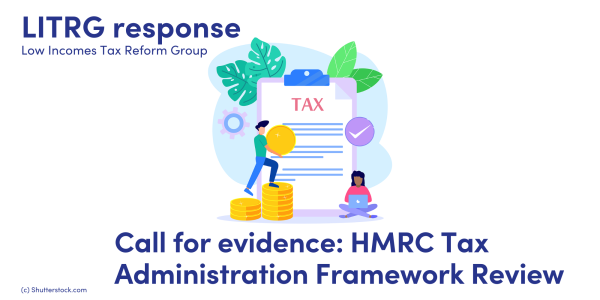Call for evidence: Tax Administration Framework Review
LITRG welcome the opportunity to respond to HMRC’s Tax Administration Framework review call for evidence. This call for evidence sought views on how the legislation underpinning HMRC’s administration of the tax system could be updated and simplified. This is part of the government’s 10 year tax administration strategy. It was published alongside a call for evidence on timely payments and the two documents should be read together. LITRG’s response to the timely payment call for evidence can be found here.

LITRG’s 60 page response to the call for evidence:
- Broadly supports reform of the tax administration system and welcomes HMRC’s attempts to seek a wide range of engagement
- Highlights the importance of setting out a clear roadmap for reform which sets out longer term goals as well as incremental changes needed towards those goals
- Focuses on low-income unrepresented taxpayers and their experiences with the tax system – website queries are included throughout the response to highlight the difficulties people face interacting with the system
- Draws and builds on the LITRG report ‘A better deal for the low-income taxpayer’ where we set out 7 principles of the tax system that should be firmly lodged in the minds of those designing and managing the tax system.
Before setting out answers the specific questions in the call for evidence, the response highlights some general themes:
- The need for the work to encompass some consideration of how simplification of the underlying tax rules could help improve its administration
- The importance of designing for everyone from the outset
- Concern about HMRC’s reliance on third party software to deliver making tax digital (MTD) without offering their own software and the precedent that this sets for future digital reform
- HMRC should encourage online filing, not mandate its use
- Delivering on Charter commitments and customer service commitments is central to building trust in the tax system
- Helping those who help taxpayers is important – that includes friends, family, the tax charities and others acting on a pro bono basis
- Interactions with other systems, such as the benefits system, should be understood and considered as part of any changes to the tax system
- The need to be wary of the increased opportunity for scams in any digital systems
In terms of priority, we also set out points which are key to any significant reforms in tax administration:
- HMRC must continue to address and fix problems with the existing system even if working towards longer term and more radical change
- One of the most urgent reforms required is redefining the lines of responsibility between HMRC and taxpayers
- In terms of using data – it must be used early to aid compliance and ensuring people are paying the right amount of tax – rather than later in the process to discover underpaid tax or require people to make claims for refunds. HMRC must make improvements in the transparency of data held about taxpayers. HMRC must also prioritise making best use of existing data before seeking to collect additional data.
- There is scope to consider improvements to the PAYE – for example improving the starter checklist and to make greater use of simple assessment
- Accurate and comprehensive guidance is critical in terms of helping people ensure they pay the right amount of tax and building trust in the tax system. We continue to have serious concerns about the standard of GOV.UK guidance and the extent to which taxpayers can rely on it and other channels of guidance and advice now provided by HMRC such as Twitter and community forums.
- Many problems with tax administration flow from worker status issues – it is a matter of priority to deal with these underlying issues and find a way of taxing gig economy workers other than through Self Assessment
- HMRC should consider the merits of consolidating taxes management legislation
- Legislation, processes and guidance must match; currently they do not always do so
- Taxpayers assume that if HMRC accept a tax return and do not query it, then it is correct – this is problematic and needs to be considered
The call for evidence document can be found on GOV.UK.
The full LITRG response can be read here.
